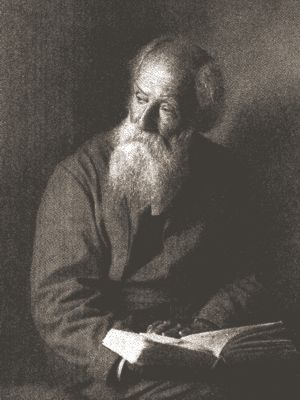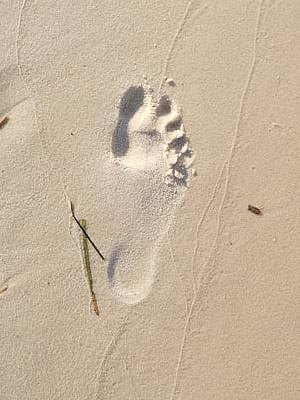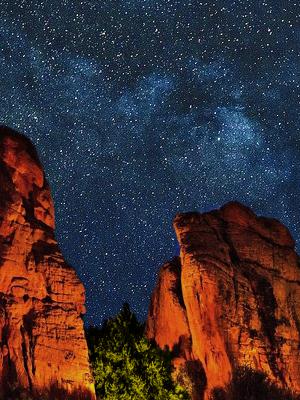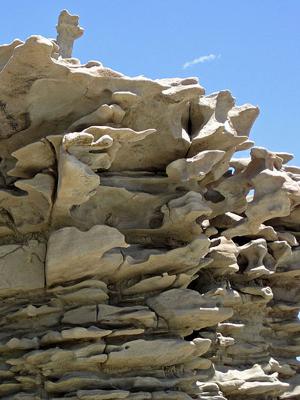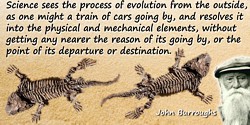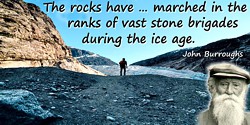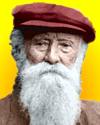 (source)
(source)
|
John Burroughs
(3 Apr 1837 - 29 Mar 1921)
American naturalist and author whose many writings and books, by celebrating nature in highly readable essays, significantly nurtured the conservation movement in the United States.
|
Scientific Faith
By John Burroughs
from The Outlook (25 Feb 1911)
[p.461] I FIND myself accepting certain things on the authority of science which so far transcend my experience, and the experience of the race and all the knowledge of the world, in fact which come so near being unthinkable, that I call my acceptance of them on act of scientific faith. One’s reason may be convinced and yet the heart refuse to believe. It is not so much a question of evidence as a question of capacity to receive evidence of an unusual kind. It is an infirmity of the understanding.
One of the conclusions of science which I feel forced to accept, and yet which I find very hard work in believing, is that of the animal origin of man. I suppose my logical faculties are convinced, but what is that in me that is baffled, and that hesitates and demurs?
Look at your friend, your child, your wife, or at the great man—poet, musician, philosopher—and try to bring home to your mind the fact that back in the abyss of geologic time the ancestor of each of these persons was an animal lower than those we spurn daily with our feet. Yet if we accept the authority of science, we are forced to this conclusion. There is no escape; we have to believe it, whether we want to or not.
Should we not find equal difficulty in believing the life history of each one of us—the start in the germ, then the vague suggestion of fish, and frog, and reptile, in our fetal life—were it not a matter of daily experience? Let it be granted that the race of man was born as literally out of the animal forms below him as the child is born out of these vague, prenatal animal forms in its mother’s womb. Yet the former fact so far transcends our experience, and even our power of imagination, that we can receive it only by an act of scientific faith, as our fathers received the dogmas of the Church by an act of religious faith.
I confess that I receive evolution only at arm’s length, as it were. I cannot get on intimate terms with it, familiarize my mind with it, and make it thinkable. The gulf that separates man from the orders below him is so impassable, his intelligence is so radically different from theirs, and his progress so enormous, while they have stood still, that believing it is like believing a miracle.
That the apparently blind groping and experimentation which mark the course of evolution as revealed by palaeontology— the waste, the delay, the vicissitudes, the hit-and-miss method—should have finally resulted in this supreme animal, man, is certainly a hard proposition.
We recoil from the horrible vista which evolution opens up in the past; that long line of low, groveling, almost brainless forms, leading down and down from one bestial creature to another still lower, from mammal to reptile, from reptile to amphibian, from amphibian to fish, from fish to worm or mollusk, and the like, makes one shudder. We smell the slime and the carnage. How the halo with which we have surrounded our origin vanishes!
Man has from the earliest period believed himself of divine origin, and by the divine he has meant something far removed from this earth and all its laws and processes, something quite transcending the mundane forces. He has invented or dreamed myths and legends to throw the halo of the exceptional, the far removed, the mystical, or the divine around his origin. He has spurned the clod with his foot; he has denied all kinship with bird and beast around him, and looked to the heavens above for the sources of his life. And then unpitying science comes along and tells him that he is under the same law as the life he treads under foot, and that that law is adequate to transform the worm into the man; that he, too, has groveled in the dust, or wallowed in the slime, or fought and reveled, a reptile among reptiles; that the heavens above him, to which he turns with such awe and reverence, or such dread and foreboding, are the source of his life and hope in no other sense than they are the source of [p.462] the life and hope of all other creatures. But this is the way of science; it enhances the value or significance of anything about us that we are wont to treat as cheap or vulgar, and it discounts the value of the things far off upon which we have laid such stress. It ties us to the earth, it calls in the messengers we send forth into the unknown; it makes the astonishing revelation—revolutionary revelation, I may say—that the earth is itself a star, and embosomed in the infinite heavens the same as any, that the creative energy is working now and here underfoot, the same as in the ages of myth and miracle; in other words, that God is really immanent in his universe, and inseparable from it; that we have been in heaven and under the celestial laws all our lives, and knew it not. Science thus kills religion, poetry, and romance only so far as it dispels our illusions and brings us back from the imaginary to the common and the near at hand. It discounts heaven in favor of earth. It should make us more at home in the world, and more conscious of the daily beauty and wonders that surround us, and, if it does not, the trouble is probably in the ages of myth and fable that lie behind us and that have left their intoxicating influence in our blood.
We are willing to be made out of the dust of the earth when God makes us, the God we have made ourselves out of our dreams and fears and aspirations, but we are not willing to be made out of the dust of the earth when the god called Evolution makes us. An impersonal law or process we cannot revere or fear or worship or exalt; we can only study it and put it to the test. We can only love or worship personality. This is why science puts Such a damper upon us; it banishes personality, as we have heretofore conceived it, from the universe. The thunder is no longer the voice of God, the earth is no longer his footstool. Personality appears only in man; the universe is not inhuman, but unhuman. It is this discovery that we recoil from, and blame science for; and until, in the process of time, we shall have adjusted our minds, and especially our emotions, to it, mankind will still recoil from it.
We love our dreams, our imaginings, as we love a prospect before our houses. We love an outlook into the ideal, the unknown in our lives. But we love also to feel the solid ground beneath our feet.
Whether life loses in charm as we lose our illusions, and whether it gains in power and satisfaction as we more and more reach solid ground in our beliefs, is a question that will be answered differently by different persons.
We have vastly more solid knowledge about the universe amid which we live than had our fathers, but are we happier, better, stronger? May it not be said that our lives consist, not in the amount of our knowledge, any more than in the amount of our possessions, but in the things we love, in the depth and sincerity of our emotions, and in the elevation of our aspirations? Has not science also enlarged the sphere of our love, and given us new grounds for wonder and admiration? It certainly has, but it as certainly has put a damper on our awe, our reverence, our veneration. However valuable these emotions are, and whatever part they may have played in the development of character in the past, they seem doomed to play less and less part in the future. Poetry and religion, so called, are doomed to play less and less part in the life of the race in the future. We shall still dream and aspire, but we shall not tremble and worship as in the past.
We see about us daily transformations as stupendous as that of the evolution of man from the lower animals, and we marvel not. We see the inorganic pass into the organic, we see iron and lime and potash and silex blush in the flowers, sweeten in the fruit, ripen in the grain, crimson in the blood, and we marvel not. We see the spotless pond-lily rising and unfolding its snowy petals, and its trembling heart of gold, from the black slime of the pond. We contemplate our own life history from the fluids and viscera of our mothers’ bodies to our stature as men and women, and we are not disturbed. But when we stretch this process out through the geologic ages and try to see ourselves a germ, a fish, a reptile, in the womb of time, we are balked. We do not see the great mother, or the great father, or feel the lift of the great biologic laws. We are beyond our depth. It is easy to believe that the baby is born of [p.463] woman, because it is a matter of daily experience, but it is not easy to believe that man is born of the animal world below him, and that that is born of inorganic nature, because the fact is too big and tremendous.
What we call nature works in no other way; one law is over big and little alike. What nature does in a day typifies what she does in an eternity. It is when we reach the things done on such an enormous scale of time and power and size that we are helpless. The almost infinitely slow transformations that the theory of evolution demands balk us as do the size and distance of the fixed stars.
No observation or study of evolution on a small scale and near at hand in the familiar facts of the life about us can prepare us for it, just as no observation of springs and rills can prepare us for the ocean; no modeling of miniature valleys and mountains by the rain in the clay bank can open our minds to receive the tremendous facts of the carving of the face of the continent by the same agents.
We do not see evolution working in one day, or in a century, or in many centuries. Neither do we catch the gods of Erosion at their Herculean tasks. They always seem to be having a holiday, or else to be merely toying with their work.
When we see a mound of earth or a bank of clay worn into miniature mountain chains and canons and gulches by the rains of a season, we do not doubt our eyes; we know the rains did it. But when we see the same thing copied in a broad landscape, or on the face of a State or a continent, we find it hard to believe the evidence of our own senses. The scale upon which it is done, and the time involved, put it so far beyond the sphere of our experience that something in us, probably the practical, every-day man, refuses to be convinced.
The lay mind can hardly have any adequate conception of the part erosion, the simple weathering of the rocks, has played in shaping our landscapes. The changes in the surface of the land in one’s lifetime, or even in the historic period, are so slight that the tales the geologists tell us are incredible.
When, during a recent trip through the great Southwest, I saw the earth laid open by erosion as I had never before dreamed of, especially when I visited those halls of the gods, the Grand Canon and Yosemite Valley, I found my capacity to believe in the erosive power of water and the weather quite overtaxed. It must be true, I said, what the geologists tell us, that water and air did all this; but while you look and wait, and while generations before you had looked and waited, all is as quiet and passive as if the slumber of ages wrapped hill and vale. Invisible giants have wrought and delved here of whom we never catch a glimpse, nor will we, wait and watch we never so long. No sound of their hammers or picks or shovels or of the dynamite ever breaks the stillness of the air.
I have to believe that the valleys and mountains of my native Catskills were carved out of a great elevated plain or plateau; there is no other explanation of them. Here lie the level strata, without any bending or folding, or sign of convulsion and upheavals, horizontal as the surface of the sea or lake in which their sediments were originally laid down; and here are these deep, wide valleys cut down through these many sheets of stratified rock; and here are these long, high, broad-backed mountains, made up of the rock that the forces of air and water have left, and with no forces of erosion at work that would appreciably alter a line of the landscape in ten thousand years; and yet we know, if we know anything about the physical history of the earth, that erosion has done this work, carved out these mountains and valleys, from the Devonian strata, as literally as the sculptor carves his statue from the block of marble. We cannot believe it as we believe our every-day experiences, because it so far transcends those experiences that it is unthinkable.
These physical forces have worked as slowly and silently in sculpturing the landscapes as the biological laws have worked in evolving man from the lower animals, or the vertebrates from the invertebrates. The rains, the dews, the snows, the winds—how could these soft, gently careering agents have demolished these rocks and dug these valleys? One would almost as soon expect the wings and feet of the birds to wear away the forests they flit through. The wings of time are feathered [p.464] also, and as they brush against the granite or the flinty sandstone no visible particle is removed while you watch and wait. Come back in a thousand years, and you note no change, save in the covering of trees and verdure. Return in ten thousand, and you would probably find the hills carrying their heads as high and as proudly as ever. Here and there the face of the cliff may have given way, or a talus slid into the valley, or a stream or river changed its course, or sawed deeper into the rock, and a lake been turned into a marsh, or the delta of a river broadened—minor changes, such as a shingle from your roof or a brick from your chimney, while your house stands as before. In one hundred thousand years what changes would we probably find ? Here in the Catskills, where I write, the weathering of the hills and mountains would probably have been but slight. It cannot be far from that time since the great ice sheet left us. Where protected by a thin coat of soil, its scratches and grooves upon the surface rock are about as fresh and distinct as we saw them just made in Alaska. Where the rock is exposed, they have weathered out, one-eighth of an inch probably having been worn away. The drifting of the withered leaves of autumn, or of the snows of winter over them, it really seems, has done as much in that stretch of time. Then try to fancy the eternity it has taken the subaerial elements to cut thousands of feet through this hard blue Hamilton sandstone! No, the evolution of the landscape, the evolution of the animal and vegetable kingdoms, the evolution of the suns and planets, involve a process so slow, and on such a scale, that it is quite unthinkable. How long it took evolution to bridge the chasm between the vertebrate and the invertebrate, between the fish and the frog, between the frog and the reptile, between the reptile and the mammal, or between the lowest mammal and the highest, who can guess?
But the gulf has been passed, and here we are in this teeming world of life and beauty, with a terrible past behind us, but a brighter and brighter future before us.
1 An editorial referring to this article appears elsewhere in this issue.—The Editors.
- Science Quotes by John Burroughs.
- 3 Apr - short biography, births, deaths and events on date of Burroughs's birth.
- John Burroughs - The Friendly Rocks - an excerpt from Under the Apple-Trees (1916), giving a naturalist's view of rocks: “The rocks are not so close akin to us as the soil ... [but they] are the final source of all.”
- John Burroughs - Great Questions In Little: Astronomic Grandeur - an excerpt from Under the Apple-Trees (1916) - reflections on the Universe, the Why and How of science, the Limitations of Science, the Beginnings of Life, and Evolution.
- John Burroughs - context of quote “Stone brigades” - Medium image (500 x 250 px)
- John Burroughs - context of quote “Stone brigades” - Large image (800 x 400 px)
- John Burroughs - context of quote “Evolution” - Medium image (500 x 250 px)
- John Burroughs - context of quote “Evolution” - Large image (800 x 400 px)
- “A Prophet of the Soul” - John Burroughs on Henri Bergson’s philosophy.
- John Burroughs - Chap XV - 01 The Ether - from Under the Apple-Trees (1916).
- Theodore Roosevelt - naturalist - In Memoriam by John Burroughs in Natural History magazine (1913).
